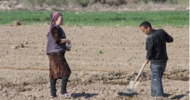Companies investing in land in Africa and elsewhere need guidelines to ensure the human rights and dignity of local communities are protected
In the run up to Rio+20, the United Nation Environment Programme Foresight Panel has flagged the adverse impact of the "new land rush" as a cause of concern.
- Economic Times
-
05 Mar 2012
IP-rich New Zealand is a logical partner for resource-rich Gulf states as a producer of food in places like Africa, says New Zealand's Minister of Foreign Affairs.
- NZ Government
-
01 Mar 2012
So is it a land grab or a development opportunity? Is land grabbing actually good for Africa? BBC Africa Debate discusses the issue in Freetown in Sierra Leone.
Pengembangan lahan perkebunan tebu Wilmar di Papua terkendala perizinan
The recent rush to acquire farmland in order to meet rising global demands for food and fuel is putting African countries at risk of bearing costs of global resource scarcity, says a new study by the Center for International Forestry Research (CIFOR).
Promoting agricultural development in Africa and addressing the world's food security challenges requires investing in farmers - not in farmland, says Lorenzo Cotula.
This Friday, February 24th, BBC Africa will broadcast a debate from Freetown Sierra Leone on international farmland deals in Africa - or Land grabbing as it’s commonly known. Listeners can join the discussion on social media.
Entities such as USAID, the World Bank, and major U.S. universities are often the architects behind these land deals, which promise benefits for Africans but can often deliver food insecurity and displacement.
The Ethiopian government has denied forcibly relocating tens of thousands of people off their land to make way for foreign investors.
Issue number 4/2011 of 'New Routes' by Life & Peace Institute (Uppsala)
- Life & Peace Institute
-
23 December 2011
Foreign investors aren't just after land in Africa. Access to water is essential – which can bring them into direct competition with the needs of local communities
- The Guardian
-
24 November 2011
"I wonder if greater returns could come for Africa if attention were paid to backing the continent’s millions of smallholders? And yet, as I speak, many are being driven off their land and swelling the ranks of the urban dispossessed."
- Prince of Wales
-
05 November 2011
Tanzanian peasaants complain that the government has been allocating huge tracts of land to certain investors in the district, while refusing to allocate the same pieces of land to local groups that had applied for them.
- The Citizen
-
03 November 2011
One of the manifestations of the greed of Africa's domestic plutocrats and their imperial overlords is the massive land grab that we are witnessing today.
- Pambazuka
-
02 November 2011
Des organisations de la société civile invitent les gouvernements des pays en développement à arrêter la location et la vente des terres aux entreprises transnationales parce que cela conduit à la dégradation des terres et à l'insécurité alimentaire.
Indian author and media commentator Anand Giridharadas joins this Al Jazeera programme along with Oakland Institute’s Executive Director, Anuradha Mittal, and Christine L. Adamow, Managing Director of Africa BioFuel, a US company invested in farmland in Kenya and Tanzania.
- Al Jazeera
-
25 October 2011
NGOs tried to get a pronouncement in the Changwon Declaration against the continued grabbing of land throughout Africa and Asia.
The French Development Agency and the UK-based Emergent Asset Management have been named as the leading investors in massive land deals involving African leaders
Participants at a 2-day High-Level Forum on Foreign Direct Investments in Land in Africa have resolved to promote land-based investment models that increase agricultural productivity and maximize opportunities for Africa’s farmers.
African experts gathered in Nairobi, Kenya, are discussing a common position to outlaw land grabbing by foreigners, the latest threat to food security in the continent.
India-based company Karuturi Global Limited is planning to make an investment of $2.5 billion in farmland in Tanzania in the upcoming years.
- IndiaCompanyNews
-
24 September 2011
Unfortunately, given the global nature of capital, even if the US were to completely shut down speculation, it would just move offshore.
- AlterNet
-
23 September 2011
Le projet vise à céder 3,3 millions d’hectares de terres aux investisseurs d’ici à la mi-2015. Cinq autres millions d’hectares seront destinés à la production sucrière.
- L'Usine Nouvelle
-
15 September 2011
The idea of combining the greed of investors with the fight against hunger as a mutually beneficial business venture has failed miserably
- Der Spiegel
-
01 September 2011
The President informed them of 3 available modules of investment that they could take advantage of including processing without getting involved in physical production where an investor buys products from farmers, processes them or engage in core plantation and process the produce into finished items or contracting out-growers so that they as a community of producers can benefit.
- Uganda Media Centre
-
21 August 2011
New report provides a detailed examination of the role of the Indian government and Indian companies engaged in overseas agricultural land acquisitions in Africa, Asia and Latin America.
Saudi Star Agricultural Development is being sued by an Ethiopian state company for failure to pay for the clearing of land in the Gambella Regional State.
- Addis Fortune
-
07 August 2011
The Chaco – which stretches across Argentina and Paraguay – is now being ripped up and converted to US-style ranchland by bulldozers even faster than it was before and the few Indians who live there have never felt more threatened, writes John Vidal
- The Guardian
-
08 July 2011
Les fonds de pension sont peut-être l’une des rares catégories d’accapareurs de terres auxquelles les gens peuvent couper l’herbe sous le pied, pour la bonne et simple raison que c’est de leur argent qu’il s’agit.















